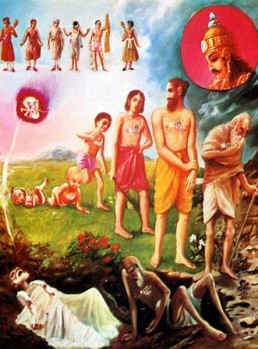Swami Chinmayananda
Swami Chinmayananda Commentary
In his discourse so far, the Lord has emphasized that a perfect-Master is one who has complete control over his sense-appetites. In India, a mere philosophical idea, in itself, is not considered anything more than a poetic ideology, and it is not accepted as a spiritual thesis unless it is followed by a complete technique by which the seeker can come to live it, in his own subjective experience. True to this traditional Aryan faith, in the Geeta too, the Lord indicates to Arjuna the practical method, by which he should struggle hard, in order to reach the eminence of perfection in all men-of-steady-Wisdom.
The ignorance of the Spiritual Reality functions in any individual in three distinct aspects: “Unactivity” (Sattwa) “Activity” (Rajas); and “Inactivity” (Tamas). When the Sattwa aspect in us is molested by the “veiling of the intellect” (Avarana) and the “lack of tranquillity” of the mind (Vikshepa), then we come to the sorrows caused by their endless roamings through the sense-organs. Unless these are well-controlled, they will drag the mind to the field of the sense-objects, and thus create a chaotic condition within, which is experienced as sorrow.
That this happens even to a highly evolved seeker, is here accepted by the statement of the Lord. With this assertion, he is warning the seeker in Arjuna, that he should not on any score let his “objective-mind” take hold of, and enslave his “subjective-intellect.” This warning is quite appropriate and timely in the scheme of thought in this chapter.
Invariably, among those who are practising religion, the common cause by which very many true seekers fall away from the Path, is the same all over the world. After a few years of practice, they, no doubt, come to live a certain inexplicable inward joy, and over-confident, and often even vainful of their progress, they relax in their Tapas. Once they come back to the field of the senses, “the turbulent senses do violently snatch the mind away” from the poise of perfect meditation!
Adi Sankara Commentary
Hi, for; kaunteya, O son of Kunti; pramathini, the turbulent; indriyani, organs; prasabham, violently; haranti, snatch away; manah, the mind; vipascitah, of an intelligent; purusasya, person; api, even; yatatah, while he is striving diligently [Repeatedly being mindful of the evils that arise from sense-objects.] — (or,) the words purusasya vipascitah (of an intelligent person) are to be connected with the remote word api (even). [The Commentator says that api may be construed either with yatatah or with vipascitah purusasya.-Tr.] Indeed, the organs confound a person who is inclined towards objects, and after confounding him, violently carry away his mind endowed with discriminating knoweldge, even when he is aware of this. Since this is so, therefore,
The Bhagavad Gita with the commentary of Sri Sankaracharya – Translated by Alladi Mahadeva Sastry
Holy Geeta – Commentary by Swami Chinmayananda
The Bhagavad Gita by Eknath Easwaran – Best selling translation of the Bhagavad Gita
The Bhagavad Gita – Translation and Commentary by Swami Sivananda
Bhagavad Gita – Translation and Commentary by Bhaktivedanta Swami Prabupadha
Srimad Bhagavad Gita Chapter 2 – Verse 60 – 2.60 yatato hyapi – All Bhagavad Gita (Geeta) Verses in Sanskrit, English, Transliteration, Word Meaning, Translation, Audio, Shankara Bhashya, Adi Sankaracharya Commentary and Links to Videos by Swami Chinmayananda and others – 2-60

